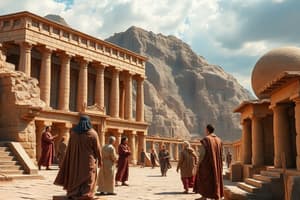Podcast
Questions and Answers
What was the primary reliance of medieval scientists, also known as natural philosophers, for their scientific knowledge?
What was the primary reliance of medieval scientists, also known as natural philosophers, for their scientific knowledge?
- Actual observations of the natural world
- Ancient scientific authorities especially Aristotle (correct)
- New ways of thinking about science
- Works of Archimedes and Plato
Which of the following was a key factor that led medieval scientists to develop new ways of thinking about science?
Which of the following was a key factor that led medieval scientists to develop new ways of thinking about science?
- Introduction of the microscope and telescope
- Reliance on careful observation and accurate measurement (correct)
- Encouragement from ancient authorities like Aristotle
- Familiarity with the works of Archimedes and Plato
What was the impact of the works of Archimedes and Plato on the beliefs of medieval scientists?
What was the impact of the works of Archimedes and Plato on the beliefs of medieval scientists?
- They discouraged new ways of thinking about science
- They had no impact on medieval scientists' beliefs
- They reinforced the ideas of Aristotle and other authorities
- They encouraged new ways of thinking about science (correct)
Which practice stimulated scientific activity among medieval scientists?
Which practice stimulated scientific activity among medieval scientists?
What were the foremost developments that encouraged new ways of thinking by medieval scientists?
What were the foremost developments that encouraged new ways of thinking by medieval scientists?
What was the primary focus of the natural philosophers, who were medieval scientists?
What was the primary focus of the natural philosophers, who were medieval scientists?
What was the field of interest shared by Copernicus, Kepler, Galileo, and Newton?
What was the field of interest shared by Copernicus, Kepler, Galileo, and Newton?
How did the Ptolemaic System differ from the 'heliocentric' system?
How did the Ptolemaic System differ from the 'heliocentric' system?
Why was Galileo under suspicion and later tried by the Catholic church?
Why was Galileo under suspicion and later tried by the Catholic church?
What was the 'universal law of gravitation' and who discovered it?
What was the 'universal law of gravitation' and who discovered it?
Name three breakthroughs in medicine and chemistry during the Scientific Revolution.
Name three breakthroughs in medicine and chemistry during the Scientific Revolution.
Who was Descartes and what theory is he responsible for?
Who was Descartes and what theory is he responsible for?
Which astronomer suggested the heliocentric or sun-centered conception of the universe?
Which astronomer suggested the heliocentric or sun-centered conception of the universe?
Who challenged the Ptolemaic System with telescopic observations?
Who challenged the Ptolemaic System with telescopic observations?
What did Pascal develop during the Scientific Revolution?
What did Pascal develop during the Scientific Revolution?
Who was known for adding to the understanding of human anatomy during the Scientific Revolution?
Who was known for adding to the understanding of human anatomy during the Scientific Revolution?
Flashcards are hidden until you start studying
Study Notes
Medieval Scientists
- Medieval scientists, also known as natural philosophers, primarily relied on the works of ancient Greeks, such as Aristotle, for their scientific knowledge.
Factors Leading to New Ways of Thinking
- A key factor that led medieval scientists to develop new ways of thinking about science was the rediscovery of ancient Greek texts, particularly those of Archimedes and Plato.
Impact of Ancient Greeks on Medieval Science
- The works of Archimedes and Plato had a significant impact on the beliefs of medieval scientists, as they introduced new ideas and stimulated scientific activity.
Practice Stimulating Scientific Activity
- Translation of ancient Greek texts into Latin stimulated scientific activity among medieval scientists.
Foremost Developments
- The foremost developments that encouraged new ways of thinking by medieval scientists were the rediscovery of ancient Greek texts and the development of experimental methods.
Primary Focus of Natural Philosophers
- The primary focus of natural philosophers, who were medieval scientists, was the natural world and the understanding of natural phenomena.
Field of Interest of Notable Scientists
- The field of interest shared by Copernicus, Kepler, Galileo, and Newton was astronomy and the study of the universe.
Comparison of Ptolemaic and Heliocentric Systems
- The Ptolemaic System, which placed Earth at the center of the universe, differed from the heliocentric system, which placed the Sun at the center.
Galileo's Conflict with the Catholic Church
- Galileo was under suspicion and later tried by the Catholic Church because his observations supported the heliocentric system, which challenged the Church's geocentric views.
Universal Law of Gravitation
- The universal law of gravitation, discovered by Newton, states that every point mass attracts every other point mass by a force acting along the line intersecting both points.
Breakthroughs in Medicine and Chemistry
- Three breakthroughs in medicine and chemistry during the Scientific Revolution were the discovery of the circulatory system by Harvey, the development of modern chemistry by Boyle, and the discovery of the lymphatic system by Aselli.
Descartes and the Theory of Mind-Body Dualism
- Descartes was a philosopher and mathematician responsible for the theory of mind-body dualism, which posits the existence of separate realms of mind and body.
Heliocentric Conception of the Universe
- Copernicus was the astronomer who suggested the heliocentric or sun-centered conception of the universe.
Challenge to the Ptolemaic System
- Galileo challenged the Ptolemaic System with telescopic observations, providing evidence for the heliocentric system.
Pascal's Contribution
- Pascal developed the barometer during the Scientific Revolution.
Contributor to Human Anatomy
- Vesalius was known for adding to the understanding of human anatomy during the Scientific Revolution.
Studying That Suits You
Use AI to generate personalized quizzes and flashcards to suit your learning preferences.



